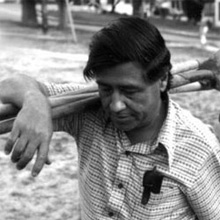 |
 |
 |
 Business News | March 2005 Business News | March 2005  
Si Se Puede - The Legacy of Cesar Chavez
 Dick Meister - ILCA Dick Meister - ILCA


| | In memory of Cesar Chavez: March 31, 1927 - April 23, 1993 (Photo: AP) |
March 31 is a special day in seven states and dozens of cities - and should be. It's Cesar Chavez Day, honoring the late founder of the United Farm Workers union on the 78th anniversary of his birth. Certainly there are few people in any field more deserving of such an honor, certainly no one I've met in more than 45 years of labor reporting.

I first met Cesar Chavez when I was covering labor for the San Francisco Chronicle. It was on a hot summer night in 1965 in the little San Joaquin Valley town of Delano, California. Chavez, shining black hair trailing across his forehead, wearing a green plaid shirt that had become almost a uniform, sat behind a makeshift desk topped with bright red Formica.

"Si se puede," he said repeatedly to me, a highly skeptical reporter, as we talked deep into the early morning hours there in the cluttered shack that served as headquarters for him and the others who were trying to create an effective farmworkers union.

"Si se puede - it can be done!"

But I would not be swayed. Too many others, over too many years, had tried and had failed to win for farmworkers the union rights they had to have if they were to escape the severe economic and social deprivation inflicted on them by their grower employers.

The Industrial Workers of the World who stormed across western fields early in the century, the Communists who followed, the socialists, the AFL and CIO organizers - all their efforts had collapsed under the relentless pressure of growers and their powerful political allies.

I was certain this effort would be no different. I was wrong. I had not accounted for the tactical brilliance, creativity, courage and just plain stubbornness of Cesar Chavez, a sad-eyed, disarmingly soft-spoken man who talked of militance in calm, measured tones, a gentle and incredibly patient man who hid great strategic talent behind shy smiles and an attitude of utter candor.

Chavez grasped the essential fact that farmworkers had to organize themselves. Outside organizers, however well-intentioned, could not do it. Chavez, a farmworker himself, carefully put together a grass-roots organization that enabled the workers to form their own union, which then sought out - and won - widespread support from influential outsiders.

The key weapon of this United Farm Workers union was the boycott. It was so effective that between 1968 and 1975 fully 12 percent of the country's adult population - that's 17 million people - quit buying table grapes.

The UFW's grape boycott and others against wineries and lettuce growers won the first farm union contracts in history. They led ultimately to enactment of the California law - also a first - that requires growers to bargain collectively with workers who vote for unionization and to substantial improvements in the pay, benefits, working conditions and general status of the state's farmworkers.

The struggle was extremely difficult for the impoverished workers, and Chavez risked his health - if not his life - to provide them extreme examples of the sacrifices necessary for victory. Most notably, he engaged in lengthy, highly publicized fasts that helped rally the public to the farmworkers' cause and that may very well have contributed to his untimely death in 1993 at age 66.

Fasts, boycotts. It's no coincidence that those were among the principal tools of Mohandas Gandhi, for Chavez drew much of his inspiration from the Indian leader. Like Gandhi and another of his models, Martin Luther King Jr., Chavez believed fervently in the tactics of non-violence. Like them, he showed the world how profoundly effective they can be in seeking justice from even the most powerful of opponents.

What the UFW accomplished, and how the union accomplished it, will never be forgotten - not by the millions of social activists who have been inspired and energized by the farmworkers' struggle, nor by the workers themselves.

The UFW won important legal rights for them. But more than union contracts, and more than laws, farmworkers now have what Cesar Chavez insisted was needed above all else. That, as he told me so many years ago, "is to have the workers truly believe and understand and know that they are free, that they are free men and women, that they can stand up and say how they feel."

Freedom. No leader has ever left a greater legacy.

Dick Meister, a veteran San Francisco journalist who's co-author of A Long Time Coming: The Struggle to Unionize America's Farm Workers. | 
 | |
 |



